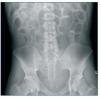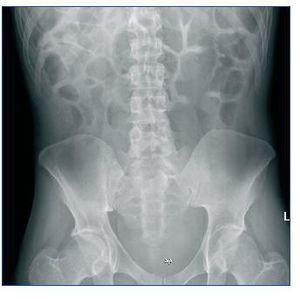Dear Editor, Colonoscopy preparation solutions are widely used due to their rare side effects. However, we must exercise caution when using them in extremely old or young patients and those with digestive and/or renal diseases.1 In patients with renal failure, it may trigger severe electrolyte imbalances, including severe hypernatraemia, hyperphosphataemia, hypokalaemia, metabolic acidosis or renal failure secondary to dehydration. We herein describe a case with those alterations and severe clinical consequences. Male patient aged 30 years with a history of congenital encephalopathy and secondary mental retardation, congenital digestive disorder, chronic renal polycystic changes with severe long-term ureterohydronephrosis and secondary chronic renal failure with recurring urinary tract infections. The patient is a dependent for all life activities. He was admitted due to a partial ileus (figure 1) secondary to foreign objects (plastics, soil, etc.), with unremarkable blood chemistry except for a serum creatinine (Cr) level of 1.4mg/dl that he already presented in previous laboratory tests. From the time he was admitted, he was treated with abundant fluid therapy and cleansing enemas, and various types of foreign bodies were obtained over the following three days. On the fourth day after admission his state of consciousness began to deteriorate progressively and the blood test showed the following: Cr, 5mg/dl; urea, 116mg/dl; Na, 197mmol/l; K, 2.6mmol/l; Cl, 159mmol/l; pH, 7.2; HCO3, 14.9mmol/l; GAP, 23; Ca, 7.4mg/dl; P, 14.9mg/dl, and osmolarity 389mOs/kg. Given data indicating renal failure, normochloraemic metabolic acidosis, hypernatraemia, hypokalaemia and hyperphosphataemia, and their severe clinical repercussions, we decided to perform a session of haemodialysis, and the patient responded well. After two additional haemodialysis sessions we obtained electrolyte levels within the normal range and resolution of the neurological syndrome that had occurred. When the patient was discharged from the hospital, nitrogen retention levels had been stabilised and were similar to those at time of admission. Due to the low clinical suspicion of this condition, diagnosis and initiation of treatment are often delayed, and for that reason, mortality is between 17 and 33% depending on the series.2 To conclude, we must evaluate the risk-benefit continuum before using a colonoscopy preparation and if it is necessary, use preparations specially designed for patients with renal failure, such as XPrep.3,4
Figure 1. Simple radiography of patient's abdomen at admission.








